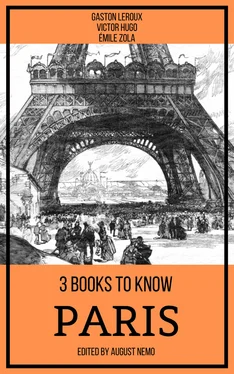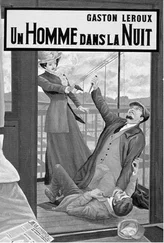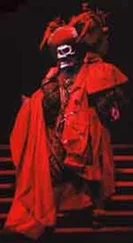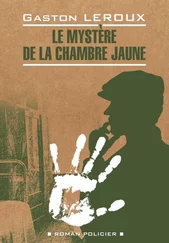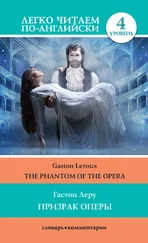“You are often alone with her?”
“A good hour every evening.”
Porn Claude frowned.
“Oh! oh! Solus cum sola non cogitabuntur orare Pater Noster.”
“Upon my soul, I could say the Pater, and the Ave Maria, and the Credo in Deum patrem omnipotentem without her paying any more attention to me than a chicken to a church.”
“Swear to me, by the body of your mother,” repeated the archdeacon violently, “that you have not touched that creature with even the tip of your finger.”
“I will also swear it by the head of my father, for the two things have more affinity between them. But, my reverend master, permit me a question in my turn.”
“Speak, sir.”
“What concern is it of yours?”
The archdeacon’s pale face became as crimson as the cheek of a young girl. He remained for a moment without answering; then, with visible embarrassment,—
“Listen, Master Pierre Gringoire. You are not yet damned, so far as I know. I take an interest in you, and wish you well. Now the least contact with that Egyptian of the demon would make you the vassal of Satan. You know that ‘tis always the body which ruins the soul. Woe to you if you approach that woman! That is all.”
“I tried once,” said Gringoire, scratching his ear; “it was the first day: but I got stung.”
“You were so audacious, Master Pierre?” and the priest’s brow clouded over again.
“On another occasion,” continued the poet, with a smile, “I peeped through the keyhole, before going to bed, and I beheld the most delicious dame in her shift that ever made a bed creak under her bare foot.”
“Go to the devil!” cried the priest, with a terrible look; and, giving the amazed Gringoire a push on the shoulders, he plunged, with long strides, under the gloomiest arcades of the cathedral.
CHAPTER III. THE BELLS.
––––––––

AFTER THE MORNING IN the pillory, the neighbors of Notre-Dame thought they noticed that Quasimodo’s ardor for ringing had grown cool. Formerly, there had been peals for every occasion, long morning serenades, which lasted from prime to compline; peals from the belfry for a high mass, rich scales drawn over the smaller bells for a wedding, for a christening, and mingling in the air like a rich embroidery of all sorts of charming sounds. The old church, all vibrating and sonorous, was in a perpetual joy of bells. One was constantly conscious of the presence of a spirit of noise and caprice, who sang through all those mouths of brass. Now that spirit seemed to have departed; the cathedral seemed gloomy, and gladly remained silent; festivals and funerals had the simple peal, dry and bare, demanded by the ritual, nothing more. Of the double noise which constitutes a church, the organ within, the bell without, the organ alone remained. One would have said that there was no longer a musician in the belfry. Quasimodo was always there, nevertheless; what, then, had happened to him? Was it that the shame and despair of the pillory still lingered in the bottom of his heart, that the lashes of his tormentor’s whip reverberated unendingly in his soul, and that the sadness of such treatment had wholly extinguished in him even his passion for the bells? or was it that Marie had a rival in the heart of the bellringer of Notre-Dame, and that the great bell and her fourteen sisters were neglected for something more amiable and more beautiful?
It chanced that, in the year of grace 1482, Annunciation Day fell on Tuesday, the twenty-fifth of March. That day the air was so pure and light that Quasimodo felt some returning affection for his bells. He therefore ascended the northern tower while the beadle below was opening wide the doors of the church, which were then enormous panels of stout wood, covered with leather, bordered with nails of gilded iron, and framed in carvings “very artistically elaborated.”
On arriving in the lofty bell chamber, Quasimodo gazed for some time at the six bells and shook his head sadly, as though groaning over some foreign element which had interposed itself in his heart between them and him. But when he had set them to swinging, when he felt that cluster of bells moving under his hand, when he saw, for he did not hear it, the palpitating octave ascend and descend that sonorous scale, like a bird hopping from branch to branch; when the demon Music, that demon who shakes a sparkling bundle of strette, trills and arpeggios, had taken possession of the poor deaf man, he became happy once more, he forgot everything, and his heart expanding, made his face beam.
He went and came, he beat his hands together, he ran from rope to rope, he animated the six singers with voice and gesture, like the leader of an orchestra who is urging on intelligent musicians.
“Go on,” said he, “go on, go on, Gabrielle, pour out all thy noise into the Place, ‘tis a festival to-day. No laziness, Thibauld; thou art relaxing; go on, go on, then, art thou rusted, thou sluggard? That is well! quick! quick! let not thy clapper be seen! Make them all deaf like me. That’s it, Thibauld, bravely done! Guillaume! Guillaume! thou art the largest, and Pasquier is the smallest, and Pasquier does best. Let us wager that those who hear him will understand him better than they understand thee. Good! good! my Gabrielle, stoutly, more stoutly! Eli! what are you doing up aloft there, you two Moineaux (sparrows)? I do not see you making the least little shred of noise. What is the meaning of those beaks of copper which seem to be gaping when they should sing? Come, work now, ‘tis the Feast of the Annunciation. The sun is fine, the chime must be fine also. Poor Guillaume! thou art all out of breath, my big fellow!”
He was wholly absorbed in spurring on his bells, all six of which vied with each other in leaping and shaking their shining haunches, like a noisy team of Spanish mules, pricked on here and there by the apostrophes of the muleteer.
All at once, on letting his glance fall between the large slate scales which cover the perpendicular wall of the bell tower at a certain height, he beheld on the square a young girl, fantastically dressed, stop, spread out on the ground a carpet, on which a small goat took up its post, and a group of spectators collect around her. This sight suddenly changed the course of his ideas, and congealed his enthusiasm as a breath of air congeals melted rosin. He halted, turned his back to the bells, and crouched down behind the projecting roof of slate, fixing upon the dancer that dreamy, sweet, and tender look which had already astonished the archdeacon on one occasion. Meanwhile, the forgotten bells died away abruptly and all together, to the great disappointment of the lovers of bell ringing, who were listening in good faith to the peal from above the Pont du Change, and who went away dumbfounded, like a dog who has been offered a bone and given a stone.
CHAPTER IV. ANANKE.
––––––––

IT CHANCED THAT UPON a fine morning in this same month of March, I think it was on Saturday the 29th, Saint Eustache’s day, our young friend the student, Jehan Frollo du Moulin, perceived, as he was dressing himself, that his breeches, which contained his purse, gave out no metallic ring. “Poor purse,” he said, drawing it from his fob, “what! not the smallest parisis! how cruelly the dice, beer-pots, and Venus have depleted thee! How empty, wrinkled, limp, thou art! Thou resemblest the throat of a fury! I ask you, Messer Cicero, and Messer Seneca, copies of whom, all dog’s-eared, I behold scattered on the floor, what profits it me to know, better than any governor of the mint, or any Jew on the Pont aux Changeurs, that a golden crown stamped with a crown is worth thirty-five unzains of twenty-five sous, and eight deniers parisis apiece, and that a crown stamped with a crescent is worth thirty-six unzains of twenty-six sous, six deniers tournois apiece, if I have not a single wretched black liard to risk on the double-six! Oh! Consul Cicero! this is no calamity from which one extricates one’s self with periphrases, quemadmodum, and verum enim vero!”
Читать дальше
